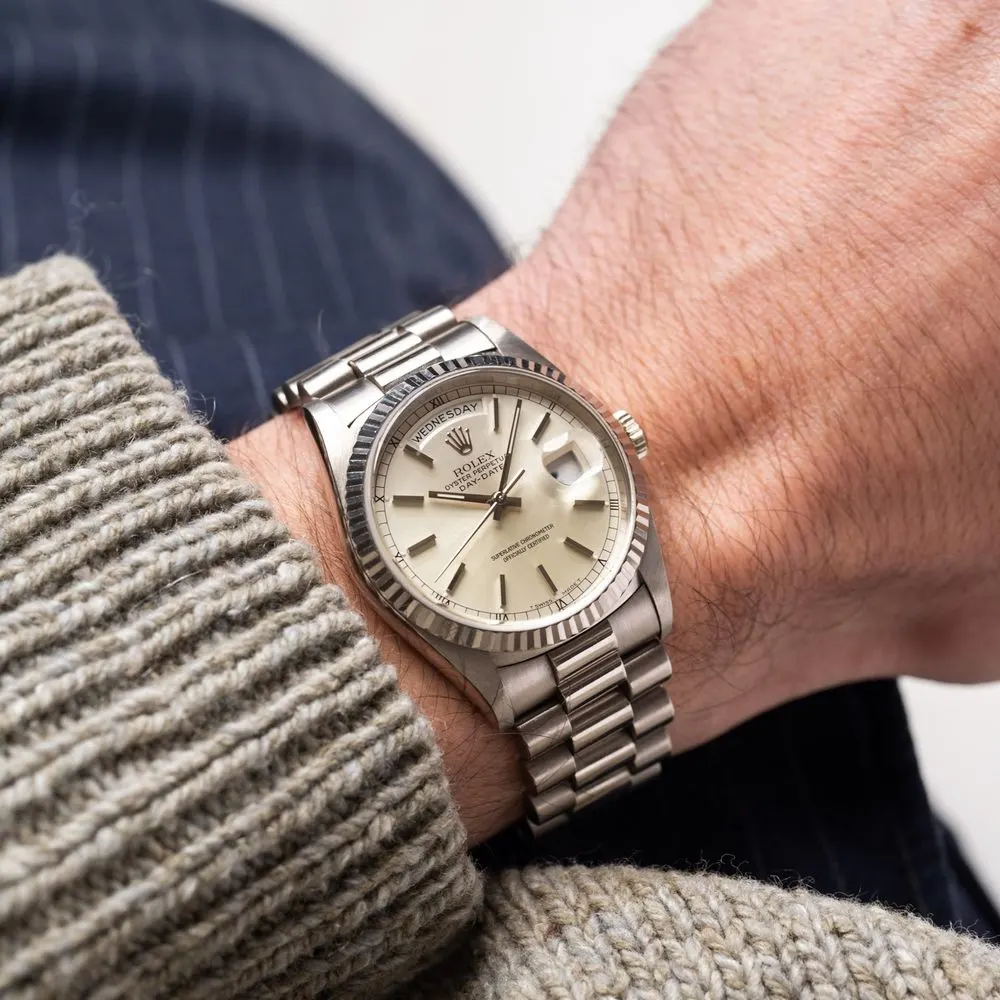The so-called "original" dials
There are many versions of the "Paul Newman" dial produced over the years: Panda, ROC (Rolex/Oyster/Cosmograph), RCO (Rolex/Cosmograph.Oyster), two colors, three colors, generation 1, 2, 3... Enough to get lost very quickly... Illustrations below with a few examples...
"Panda" dial on Rolex Daytona 6262

"Three color" dial on Rolex Daytona 6263

Rolex 6263 three-color dial (red graduated minute counters). RCO: ROLEX/COSMOGRAPH/OYSTER and DAYTONA inscription. (Photo credit © Christie’s).
Rolex 6262 "Panda" dial two colors (white graduated minute counters). ROLEX/COSMOGRAPH/DAYTONA inscription. (Photo credit © Christie’s).
The Paul Newman dials are manufactured on a so-called "Step" plate. These brass dials were made by the company Singer, one of the main dial manufacturers for Rolex.
Two-dimensional representation of a "step dial"

Three-dimensional representation of a "step dial"

Seen this way, the identification is relatively simple... Of course, it is necessary to see the watch because a simple photo makes it difficult to differentiate between a "Step" dial and a "Non-Step" dial.
There are many variations of Paul Newman dials, some of which are not original. A Paul Newman dial in the following version
ROLEX
OYSTER
COSMOGRAPH
DAYTONA
...has simply not been produced.
The different configurations of the Rolex Daytona "Paul Newman" dial
The tables below represent the configurations seen to date and since the beginning of the production of the Paul Newman models.
For the references unmarked "OYSTER"
| DIAL | CONFIGURATION | REFERENCES |
|---|
| Black dial (three colors - black/white/red) |
Rolex/Cosmograph and Daytona |
6239/6240 (proto screw pushers)/6241/6262/6264 |
| White dial (three colors - black/white/red) |
Rolex/Cosmograph and Daytona |
6239/6240 (proto screw pushers)/6241 |
| Two color white dial (White background and black sub-counters - Panda) |
Rolex/Cosmograph and Daytona |
6262/6264 |
For the references marked "OYSTER"
| DIAL | CONFIGURATION | REFERENCES |
|---|
| Two color Panda dial (ROC without Daytona) |
Rolex/Oyster/Cosmograph without Daytona |
6263/6265 |
| Black "RCO" dial three colors (Rolex/Cosmograph/Oyster) |
Rolex/Cosmograph/Oyster with Daytona |
6263 |
The so-called "non-step" dials
Let's look at a "Non-Step" dial, now considered fake. We specify "now" because as mentioned above, this has been widely debated, from collector circles to courtrooms... The various protagonists who have investigated this dial have finally ruled that it is not original, even if none of them has ever really been able to know whether it was manufactured by Singer and then rejected by Rolex to eventually be "leaked" from the company and resold to collectors or dealers, or if it was manufactured by a third party...
The fact remains that it can now be considered fake despite a certain number of these dials currently in circulation.
Two-dimensional representation of a "non-step" dial

Three-dimensional representation of a "non-step" dial

These illustrations will undoubtedly be easier to decode than a dozen articles on the subject, especially considering that the chronology of these articles starts around 2013/2014. Therefore, it is difficult to keep track of the discussions as they have evolved over time. Add to this the "Non-Step" dials sold by renowned auction houses with descriptions justifying the legitimacy of the dial and you will quickly be in significant confusion. "Non-Step" dials are now considered non-conforming dials, quite simply. Maybe one day an official document will contradict this, but such has not yet happened.
And to make matters worse, let's not forget the dials produced (still to this day), by more or less skilled counterfeiters... but unfortunately present on the vintage watch part market.
The counterfeit dials of Rolex Daytona "Paul Newman"
Here we will make some comparisons with a real dial. The counterfeit that we are using as a model corresponds to a single dial and there are probably other fake dials with different attributes. But it is interesting to note that a fake dial, while it shows differences between productions and suppliers, the original Rolex dials, on the other hand, show the same peculiarities, according to their years of production. We won't dwell on this because specialized sites already offer a sufficiently large illustrated literature.
We will cover 3 aspects of this counterfeit
The general view of the dial

Overview of the fake dial
The dial above is considered a fake dial: it is "No-Step" and the configuration of its inscriptions is non-conforming "ROLEX-OYSTER-COSMOGRAPH-DAYTONA" (ROC).
The "Singer" engraving
The "Paul Newman" dials were produced by the SINGER company. The counterfeiters did not hesitate to affix this "signature", either.

Fake SINGER engraving.
It is interesting to note the differences in typefaces (font), especially the slash in the "R" and the "SJ" logo (Jean Singer) (left bar of the "J").

Original engravings. ©Perezcope.
Typeface and prints
Even though original Paul Newman dials show differences in printing according to the references and years of production, the tools used still maintain a certain homogeneity, which is far from the case for the productions of fake dials.

"T SWISS T" once again showing the wrong typeface.

Original prints (wave effects, or pyramids). ©Perezcope.

Minute counter showing the wrong typeface.

Original prints. ©Perezcope.
The future of Rolex Daytona Paul Newman dials
Since everyone has agreed on the legitimacy of the "Non-Step" dials (and not on their origin), it is not so difficult to form an opinion on an original Paul Newman dial. However, it remains to consider the evolution of the counterfeiters' techniques. The tools used today by various restorers, particularly during the restoration of used cases, show us that the limits can be greatly exceeded. Let's stay vigilant!
By Fabrice Guéroux, with 41Watch























